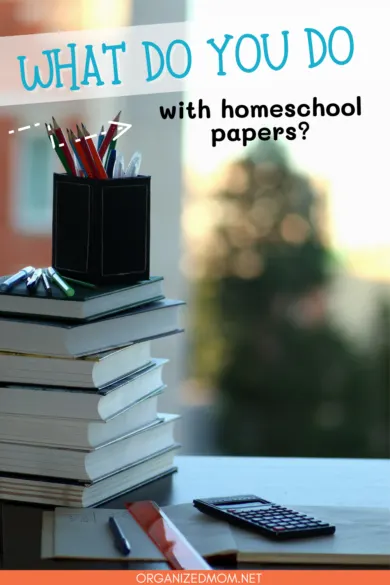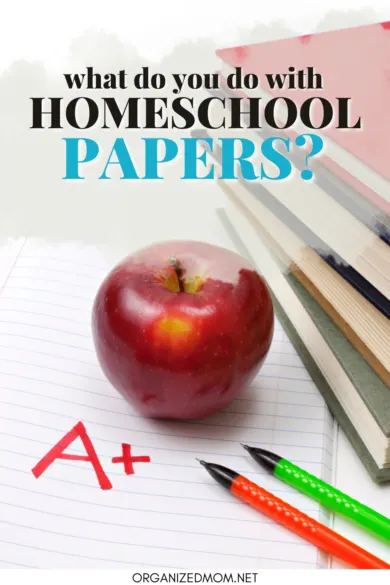Homeschooling your children is a considerable task. Any parent or guardian who takes on the responsibility of providing their child with a balanced and well-rounded education will soon discover there’s more to it than teaching. You will find there are a lot of homeschool papers that must be dealt with.
Homeschooling your child will generate a lot of administrative paperwork. You will need to safely store coursework, textbooks, and tests throughout the year. Some records and curriculum papers must be kept for assessment purposes and to fulfil the legal requirements of homeschooling.
While many homeschool curriculum providers create coursework, timetables, textbooks, and exam papers, you will need to keep homeschool papers for your records. Keeping your homeschool paperwork organized helps you with the legal side of things and helps your child stay on track.
What Do You Do With Homeschool Papers?
State requirements will differ across the US, but most need you to file a notice of intent with your local school officials. However, Rhode Island and Massachusetts require parents who wish to homeschool to apply for and get permission before they begin schooling.
Ensure that your kids are getting a proper education and that standards remain high; there are specific requirements most homeschoolers must meet. By keeping records of all your homeschool papers, you can be sure to have the necessary information on hand when needed.
Because states have varying requirements for acceptable curriculums, you’ll need to check your state laws to determine which paperwork is mandatory. Some states need to see the curriculum in advance, while others have more leeway.
More than half the states no longer require standardized testing or assessment. Suppose you want your children to do well after they have completed school. In that case, have an external evaluation or take part in standardized tests so that you have records of their education.
Even if you consider evaluation unnecessary, keeping your homeschool papers in order will help you. Records guide you and your kids to reach your goals and give you a good idea of which areas need more attention.
As it turns out, paying attention to the administrative side of homeschooling will make you a better, more structured educator for your kids. Having all the paper easily accessible avoids being caught out.
What Papers do States Require For Homeschooling?
The authorities want to ensure that children not enrolled in public schools still get the support and education they need to enable them a successful life. This education focuses mainly on reading, grammar, spelling, civics and mathematics.
The teaching should be done recognizably, with real intent to provide children with a good education. Usually, these teaching methods take the form of textbooks, computer software, written workbooks, and internet-based classes.
Depending on your state’s homeschooling laws, you may have to meet different requirements for both the teaching side and the record-keeping and testing aspect.
For example, in Texas, you can homeschool children without needing a teaching degree, which enables many parents to homeschool their children. However, in Virginia, the teaching parent must prove they have a valid high school diploma or hold a state-approved teacher’s certificate.
In August, homeschoolers often prepare to file notices of intent, show their curriculums, and send test scores. Rather than a chore, this period is an opportunity for homeschoolers to show others how varied and powerful their educational choice is.
Your local homeschooling community is an excellent way to get information from others who have dealt with the state’s legal requirements. They can help guide you regarding what paperwork is necessary and how to make applications or get additional support and structure.
How Do You Record Homeschooling?
You’ll need to keep your records on your curriculum to have a good structure for your school year. But you’ll also need records of any tests passed, additional extracurricular activities, and even social events throughout the school year.
After all, you want to provide your kids with an excellent and well-rounded education that doesn’t leave them feeling lacking. Having visual records also helps you to easily keep on track as you progress through the school year.
Wall Calendar
An enormous wall calendar was the most important thing to help keep me organized when homeschooling my daughters. I needed enough space to record upcoming tests, due work, and special events easily.
Having something that both myself and my kids could quickly glance at to keep track of where we were, made both them and myself feel like we had better control over the school year.
Younger kids can be taught to feel empowered by their schooling rather than controlled by it, and older teens can better understand what is needed from them to reach their goals. This is especially useful as older children become more self-led in their education.
I recommend having a suitable wall planner or calendar that will appeal to the age of the child you’re teaching, or that can be modified to suit. A dry-erase whiteboard calendar is perfect as it’s easy to add colorful, fun magnets, and events and dates can easily be modified to suit.
Planner and Journal
As your child’s educator, you must control how the year pans out. A personal planner is an excellent way to keep yourself organized and record your lesson plans. While the wall calendar or whiteboard is your homeschool’s ‘public face’, the planner is where you keep your personal tracking done.
The journal allows you to reflect on what you achieved with your children each week, cross-reference with your planner to ensure you’re on track or think of ways to modify your plans.
You can have a planner for each child and use that to assess and track how they are keeping up with their assignments. These record books make an excellent overview of how your child is doing in their school work.
File Storage
Your children will likely generate a lot of written work, and you will want to keep test papers. It doesn’t take long for all that paperwork to mount up, and a homeschool classroom can quickly become a mess if you don’t find a way to keep all that work organized.
As you progress through the year, you’ll find some things you won;lt need often but still need to keep, short-term storage for daily use items, and monthly organization to be done.
A well-organized homeschool room makes schooling feel less overwhelming. You can quickly find the necessary records with everything in the right place. Below is my recommended system for filing homeschooling papers.
Homeschooling Filing System
Keeping your papers right will make life easier for you and your kids. I recommend having a set-up where you have space for daily files, monthly assignments, and storage boxes for large projects or old work.
If you’re homeschooling more than one child, have boxes and files for each child and each year. You never know when older schoolwork will come in handy for revision or for your assessment and reminders of what worked and didn’t.
Some papers might be reusable in subsequent lessons with other children, and it helps if you can save money by not printing things you already have.
Besides all the daily papers produced from lessons, you’ll also want to keep a separate folder of all the essential legal paperwork required by your state. This could include yearly overviews of your curriculum, test papers, and any diplomas they have earned.
Your curriculum itself will also generate a lot of paperwork. There will be guidebooks for you, and often many textbooks, workbooks, and notebooks for each subject. While homeschooling curriculums will differ, you’ll inevitably need shelving space for your children’s books.
Some subjects will generate more papers and projects than others. For example, art and creative subjects may require storage for big, bulky projects, while math might need lined paper for working out.
Bookshelves
Whether you’re using your shelves for books or files, you’ll need someplace to store all your generated paperwork. Keep subjects grouped together and each child’s work in the same place.
Bookshelves or storage shelves are a must for most homeschool classrooms.
Plastic Storage Totes
Keep old work that doesn’t require instant access or large projects in stackable storage totes. These are excellent for long-term storage and can easily be stacked out of the way in a basement or garage, as necessary.
Especially if you are schooling several children, keep your boxes labeled, so it’s easy for you to find the notes or projects you are looking for.
Document Boxes
These small plastic document boxes are excellent for keeping your yearly school papers in order in your schoolroom. The bright colors make them fun and easy to find while keeping your schoolroom bright.
Use these boxes to keep subject workbooks for the year, and label each with the subject and student for easy organization.
Cascading Wall Organizer with Folders
For your weekly organization, hang a cascading organizer that takes several folders. You can use each folder for a different subject and keep any weekly notes or projects in these.
If you work on a homework system, it’s also a place where your child can put their homework or tests in for marking so that nothing goes missing. A weekly organizer like this is invaluable for keeping up with the daily work.
Once the week’s work has been done and is no longer necessary to have on hand, you can transfer it to one of the larger document boxes.
Accordion File Organizer
Or as I call it, the test papers organizer. I like to have test and project results easily on hand for each subject so I can see at a glance where we need to strengthen our work.
An accordion file organizer allows me to keep test papers separate and clearly marked by subject and month.
The accordion file organizer is an excellent way to store all the legal paperwork, including any standardized tests or external teaching evaluation that has been done. I use it for keeping extracurricular achievements such as music diplomas and athletics reports.
Scrapbook Cart
I use a rolling scrapbook cart to keep all the small pieces of paper like flashcards, craft supplies, additional notebooks, and scrap paper.
I also use a second cart to keep pens, pencils, erasers, and other stationery on hand. I find these very useful for extra homeschool storage.
What Records Must I Keep for Homeschooling?
As you can see, you will generate a lot of paperwork throughout the school year, and eventually, you’ll want to get rid of some of that clutter. Naturally, you don’t want to make a mistake throwing away something important.
Once you have checked the legal requirements for your state, you’ll know what papers are fundamental to keep. Here are the records we recommend keeping:
- Your declaration of intent to homeschool
- And legal forms such as homeschool registration
- Curricular summary/overview
- Records of standardized tests, whether they were taken at home or externally
- An academic transcript showing grades and accomplishments. You can see examples of transcripts here, though some curriculums will include them
- Portfolios for assessment
- This can include: showcase portfolios that give the best examples of your child’s progress throughout the years you have been schooling them
- Working portfolios that highlight the current year’s school progress in different subjects
- Grade Books or report cards
- A GPA for high school students
- Records of any community service or internships your child has done.
- Records tracking extracurricular activities that your child has taken part in. Examples include leadership camps, drama, music, and athletics.
Conclusion
While it can seem overwhelming to look at just how much paperwork you’ll need to keep when you plan to homeschool, safely organizing these records will make things much more manageable.
From a legal standpoint, you will have records of everything needed to prove your child is educated according to state law. If your child wants to return to public school, these records will make it easier.




